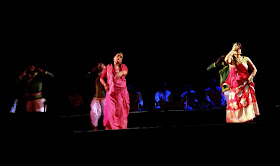(Pravin Smriti Natyotsav, 2017 at Kalidas Rangalaya, Patna)
[इस समीक्षा का हिन्दी संस्करण यहाँ देखिये http://biharidhamaka.blogspot.in/2017/04/1042017.html]
* PAINS OF MISSING THE ROOTS *
'Bidesia' is no way a story of husband and wife. It is, in fact a graphical account of cultural conflict i.e. native vs. alien culture. A person cuts himself off from his root and hopes to earn more but the bewilderment amidst the glitters is piercing his heart all the time. He ultimately finds solace only into his own native land even though having less wealth but more peace of mind.
Bidesi is very poor villager and he comes to know that people can earn more in Kolkata. In a hurry he decides to go to Kolkata. His beautiful wife stops him going there. After a series of several tantrums he is able to flee from the contiguity of his wife Pyari Sundari, goes to Kolkata and joins some work. With the passage of time he forgets his wife and the plight of Pyari Sundari becomes pathetic out of the negligence by her husband. She suffers a lot in her despondence. A comedian characters tries to put smile on her face but in vain.
Then Pyari comes across Batohi, the traveler and pours in all her sufferings before the old man. Batohi, being a poet, is heavily moved and becomes restless thinking how to remove the agonies of this fair innocent lady. He says to her to jot down all her hurt feelings which he would carry to his husband. Pyari expresses herself in the form of a Barahamasa song and gives it to Batohi. Batohi reaches Kolkata facing a lot of problems and succeeds in meeting Bidesi there. He is shocked to find him with another wife and two children.
Batohi convinces Bidesi to leave this alien place and go back to his native village where his original wife is waiting for him in deep despair. He hands over the letter of Pyari and Bidesi chants the song Barahamasa written in that letter. After this Bidesi repents much and decides to return to his village. His second wife with the help of her two children desists him from doing so. But Bidesi is adamant and a aggressive on his decision. Then the second wife threatens to marry another man. Bidesi does not heed to her and comes back to his house along with Batohi.
When he reaches his house he finds that his brother was trying to force his wife for illicit relation. Seeing Bidesi the miscreant brother flees away and Bidesi's faith in his wife is doubled. Both Bidesi and Pyari hugs each other. Though in the climax, the second wife also arrives there with her children and creates a scene. Bidesi is perplexed what to do though he somehow tells the truth to both of them. After a little quarrel all are ready to live together in the village.
We have to understand that Bhikari Thakur is not preaching that a husband should marry another woman and the first woman should be forced to suffer betrayal by her husband. Bhikhari Thakur, the most popular legendary poet and dramatist in Bhojpuri history, has just used the narrative of husband wife to convey the conflict of native versus alien culture. A man must preserve his own culture and let other be attracted to it rather than being attracted by them. Using original and second wives as the symbols of native and alien culture makes the play hugely simple and comprehensible even to illiterate persons to whom this play was targeted when it was written.
Sanjay Upadhyay is an icon of contemporary Indian drama and there is no doubt in the prowess shown by him in his presentation this time again. His Nirman Kala Manch has presented a large number of plays based on varied folk and ethnic elements of Bihari culture. In other words, he is rejuvenating the elements of traditional Bihari culture to make it more suited to contemporary period. His lighting was also good.
Abhishek Sharma lives the character of Batohi so naturally that people think that he is born for this only. Sharada Singh is an extraordinarily talented senior actor who did full justice while expressing the sufferings of Pyari Sundari through her maudlin facilal expressions. Suman Kumar in the title role of Bidesi acted adequately well and Ruby Khatoon also matched with all her coquetry and tantrums. Kundan Kumar as comedian and a son, Md. Ashf as the old woman and another son along with Pappu Kumar as devar gave a good show.
The presentation was replete with music, dance and song. Dancers included Mukesh Rahul, Satya Prakash, Ruby Khatoon, Uday, Rishikesh and Vinita Singh. They moved well in tune.
Sharda Singh and Suman Kumar (main characters of the play) are themselves extraordinary singers and so they actually sang in the sequences which otherwise would have been done by background singers. The group of talented singers included Pappu Thakur, Krishna Kumar and the virtuoso musicians were Rajesh Ranjan, Santosh Tunni, Md, Joney, Md. Noor. Dresses were by Rajiv Roy and make-up by Vinay Raj. Anjarul, Prabodh, Purushottam Jay Bharti, Shailendra and Dhananjay also helped in the presentation of the drama.
Your response over the article or suggestion for improvement may be sent through e-mail at hemantdas_2001@yahoo.com















No comments:
Post a Comment
अपने कमेंट को यहाँ नहीं देकर इस पेज के ऊपर में दिये गए Comment Box के लिंक को खोलकर दीजिए. उसे यहाँ जोड़ दिया जाएगा. ब्लॉग के वेब/ डेस्कटॉप वर्शन में सबसे नीचे दिये गए Contact Form के द्वारा भी दे सकते हैं.
Note: only a member of this blog may post a comment.